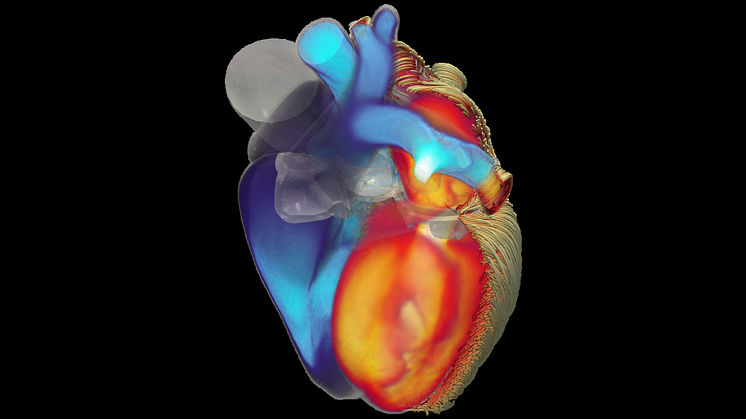
Press release -
iHEART Simulator, a mathematical model of the heart to revolutionise cardiac research
Milan, 18 September 2023 - A mathematical and computational model of the human heart entirely developed at Politecnico di Milano and designed for studying coronary artery disease. This is the focus of research published in the prestigious journal Nature Scientific Reports, entitled 'A comprehensive mathematical model for cardiac perfusion'. The project was born from the collaboration between the MOX lab of the Department of Mathematics and the LaBS of the Department of Chemistry, Materials and Chemical Engineering 'Giulio Natta' of Politecnico di Milano, and now presents the results of the iHEART Simulator.
What makes iHEART Simulator unique is its ability to combine the complex processes of electromechanics, haemodynamics and cardiac perfusion into a single platform. This level of integration offers unprecedented biophysical accuracy in the simulation of heart function and related diseases.
One of the most innovative aspects of this study is the application of this model to the analysis of coronary artery disease, such as ischaemia and acute myocardial infarction. Thanks to the iHEART Simulator, researchers will be able to study these diseases in a more detailed and accurate manner, paving the way for new therapies.
In collaboration with the IRCCS Ospedale San Raffaele di Milano and Humanitas Research Hospital in Milan, the iHEART project has also developed mathematical models to understand cardiac arrhythmias such as ventricular tachycardia or atrial fibrillation. These models have made it possible to identify key factors in the onset and maintenance of arrhythmias. It has thus been demonstrated that cardiac mathematics can support and consolidate the electrophysiological study in the localisation of intervention areas on the heart wall. In addition, increasingly faster algorithms are also being studied and are in an advanced development phase; they will allow this type of analysis to be carried out in real-time, significantly speeding up the surgery decision-making process.
In collaboration with Ospedale Sacco di Milano, a model was also developed to guide cardiac surgeons in removing part of the interventricular septum to treat hypertrophic obstructive cardiomyopathy. Mathematical simulation is part of the pre-operative phase and has been considered by doctors as an effective guidance tool for this delicate surgery.
In collaboration with Ospedale Santa Maria del Carmine in Rovereto (Trento province), a mathematical tool was created to optimise cardiac resynchronisation therapy. This reduces the time for mapping the left ventricle, which is necessary for implanting a resynchronisation device, and thus also reduces the patient exposure time in invasive treatments and guides the placement of the catheter in the most curative location for the decompensated patient.
iHEART Simulator is the result of years of research within the 'iHEART' (Integrated Heart) project funded by the European Union through an ERC Advanced Grant. The project, directed and coordinated by Professor Alfio Quarteroni, ran from 2017 to 2023 and aimed to develop the first comprehensive mathematical model of the human heart and its diseases.
The results of this study were presented in a Plenary Lecture by Professor Quarteroni at the ICIAM 2023 Conference in Tokyo, where he was awarded the prestigious Lagrange Prize by the International Council for Industrial and Applied Mathemati
Related links
Topics
Categories
Politecnico di Milano is a scientific-technological university which trains engineers, architects and industrial designers.
The University has always focused on the quality and innovation of its teaching and research, developing a fruitful relationship with business and productive world by means of experimental research and technological transfer.
Research has always been linked to didactics and it is a priority commitment which has allowed Politecnico Milano to achieve high quality results at an international level as to join the university to the business world. Research constitutes a parallel path to that formed by cooperation and alliances with the industrial system.
Knowing the world in which you are going to work is a vital requirement for training students. By referring back to the needs of the industrial world and public administration, research is facilitated in following new paths and dealing with the need for constant and rapid innovation. The alliance with the industrial world, in many cases favored by Fondazione Politecnico and by consortiums to which Politecnico belong, allows the university to follow the vocation of the territories in which it operates and to be a stimulus for their development.
The challenge which is being met today projects this tradition which is strongly rooted in the territory beyond the borders of the country, in a relationship which is developing first of all at the European level with the objective of contributing to the creation of a single professional training market. Politecnico takes part in several research, sites and training projects collaborating with the most qualified European universities. Politecnico's contribution is increasingly being extended to other countries: from North America to Southeast Asia to Eastern Europe. Today the drive to internationalization sees Politecnico Milano taking part into the European and world network of leading technical universities and it offers several courses beside many which are entirely taught in English.

